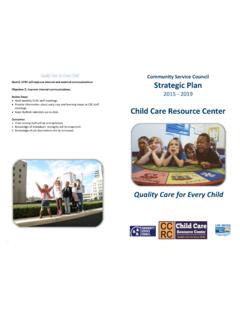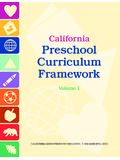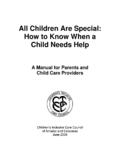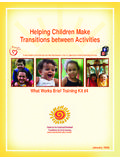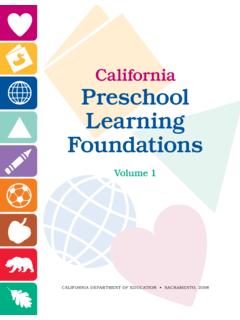Transcription of Credentials Child Development Associate (CDA) Credential
1 Supporting Head Start quality today, impacting Arizona s tomorrow! Credentials Child Development Associate (CDA) Credential The design of the Child Development Associate (CDA) Credential program is based on the belief that teaching and home visitor skills and abilities can be demonstrated. The CDA Program is designed to assess and Credential early childhood care and education professionals based on performance. A Child Development Associate (CDA) is an individual who has successfully completed the CDA assessment process and has been awarded the CDA Credential . CDAs are able to meet the specific needs of children and work with parents and other adults to nurture children's physical, social, emotional, and intellectual growth in a Child Development framework.
2 Currently, the Council serves as a collaborative partner and maintains a cooperative agreement with ACF-Office of Head Start to support staff Development for teachers, teacher aides, and home visitors employed in Head Start, Early Head Start, and other Child care programs. This partnership supports career paths that encompass CDA and academic Credentials . This is a nationally recognized Credential . The Credential is issued initially for 3 years and every 5 years thereafter, per successful CDA renewal completion. CDA Credential Settings: Center-based Credential o Infant/Toddler Center-based Credential o Preschool Center-based Credential Home Visitor Credential Family Child Care Credential Bilingual endorsements are available for all of the settings.
3 Note: ONLY the Council for Professional Recognition can award this Credential through the application process. Training Requirement: The eligibility requirement for CDA Candidates to have 120 clock hours of formal Child care education may be met through participation in the wide variety of training available in the field, including in-service. While the formal education hours can be credit or noncredit, the hours must be through an agency or organization with expertise in early childhood teacher preparation. The agency or organization must provide verification of the Candidate's education in the form of a transcript, certificate, or letter.
4 Supporting Head Start quality today, impacting Arizona s tomorrow! The 120 clock hours of education must be documented, with no fewer than 10 hours in each of the following content areas: 1. Planning a safe, healthy, learning environment 2. Steps to advance children's physical and intellectual Development ; 3. Positive ways to support children's social and emotional Development ; 4. Strategies to establish productive relationships with families; 5. Strategies to manage an effective program operation; 6. Maintaining a commitment to professionalism; 7. Observing and recording children's behavior; and 8.
5 Principles of Child Development and learning. Note: NO college or university can award this Credential although college coursework can be used to meet the training requirements. Eligibility Requirement: Candidates seeking to apply for CDA assessment in any of the three settings (center-based, family Child care, and home visitor) must meet the following eligibility requirements: Be 18 years of age or older Hold a high school diploma or GED Have 480 hours of experience working with children within the past five years Have 120 clock hours of formal Child care education within the past five years Candidates applying for a Bilingual Endorsement must meet the above requirements and be able to speak, read, and write well enough in both English and another language to understand and be understood by both children and adults.
6 All Candidates must also be able to identify an appropriate setting where they can be observed working as the lead caregiver. Application & Assessment Requirement: Upon receipt of an Application Packet, a Candidate is ready to begin working on the requirements for CDA assessment. These requirements are completed in three phases: preparation of necessary materials; filing of application; and verification of competence and knowledge. Supporting Head Start quality today, impacting Arizona s tomorrow! Preparation: The first set of requirements involves the Candidate documenting evidence of her or his competence from the following three sources: 1.
7 The Professional Resource File (prepared by the Candidate) 2. The Parent Opinion Questionnaires (collected by the Candidate) 3. The CDA Assessment Observation Instrument (completed by the Advisor) Application: When the above documentation is complete, the Candidate and Advisor sign the Application Form and send it to the Council with the assessment fee ($325) and training documentation. This begins the CDA Assessment Process and the Council assigns a Council Representative to conduct the Verification Visit. Verification Visit: The second set of requirements involves a Council Representative visiting the Candidate to verify competence and knowledge using two methods: 4.
8 The Early Childhood Studies Review (administered by the Council Representative) 5. The Oral Interview (conducted by the Council Representative) Upon receipt of a Candidate's Application Form, the $325 assessment fee, and documentation of training, the Council schedules a Verification Visit by a Council Representative. The Council Representative contacts the Candidate to arrange the date and place for the visit. These assignments are made four times a year according to the following timetable: Application Deadline For Assessments to Occur December 1st 1st Quarter: January, February, March March 1st 2nd Quarter: April, May, June June 1st 3rd Quarter: July, August, September September 1st 4th Quarter: October, November, December For complete information, contact the Council for Professional Recognition at Supporting Head Start quality today, impacting Arizona s tomorrow!
9 Family Development Credential (FDC) The program is a nationally respected training and credentialing program developed with input from families, frontline workers, supervisors and policy makers. The FDC program collaborates with agencies to teach family workers how to coach families to set and reach their goals for healthy self-reliance. Based on Cornell University research, the interagency FDC program is available in communities across New York and many other states* to frontline workers from public, private and non-profit service systems ( home visitors, case managers, family resource center workers, community health workers).
10 *Arizona is currently in the approval process to offer the FDC program. Contact AHSA for further information. Following fifteen years of Development at Cornell and widespread dissemination, on January 1, 2010, the FDC program proudly joined the Center for Transformative Action (CTA). The Credential is now issued by the Center for Transformative Action. Many workers earn college credit for earning the FDC, through local community colleges, or PONSI-affiliated universities and colleges nationwide. To earn the FDC, front-line workers take 90 hours of classes based on Empowerment Skills for Family Workers (Forest 2003), complete a portfolio documenting their ability to apply these concepts and skills, and pass a standardized exam.




